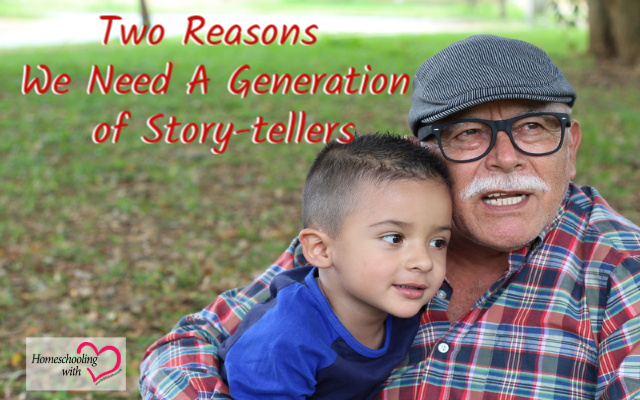Two Reasons We Need A Generation of Story-tellers


I could tell by the look on their faces we weren’t connecting. I also knew by the clenching grip of failure I felt in my stomach I didn’t know how to fix it. But I wanted them to know. I wanted them to understand. But these facts and concepts I found so utterly fascinating was not translating to my hearers.
After experiencing this feeling too many times, I’m discovering when facts are right and passion is there, teachers need one more ingredient: the art of story-telling. In fact, if you want to give your children a skill that will set them apart, teach them how to tell engaging stories. It is in demand everywhere, and it will be even more so as story becomes more lost and fumbled in American culture. Here is why.
Story-telling Contradicts an Anti-God Worldview
Stories by nature require purpose, moral values, and authorship. Thus, story is seen as a hated, necessary evil in our age. The ungodly cannot ignore it, because we as humans have an unquenchable hunger for story. But they do hate it, as seen in the disintegration of Hollywood’s story-craft and the disdain public schools hold for history. Peck in the question “why do we love stories” into your search engine and you will find speculation, wild theories, and bafflement as to why evolved primates love stories, but no answers for either the origin of that love or the very concept of story itself.

The Coming Famine of Story-tellers
As Bible believers, it should be no mystery why the heart craves purpose; the conscience cheers for right prevailing over wrong; the brain synchronizes with story emotion. If mankind is created in the image of God, then the Bible not only unveils the origin of story, but the best specimen of story. Without a great Author there is no story, and human beings simply must have story.
Because story-telling cannot exist without God any more than houses without support structures, a day is coming when Christians will dominate the arena of story. The question is will our children be prepared? The first step is to tell them stories yourself. Don’t make them perfect; just think about your children more than yourself and the words will come. Tell Bible stories. Tell family, local, American, and world stories. Tell stories about people with great successes and people with great failures. Better yet, tell them your successes and failures. Then encourage them to tell you stories about their day, making a bird feeder, the lost fawn in the woods, Grandpa playing with his new vacuum cleaner until they speak story as fluently as English. It’s only a start; there is so much more fun to be discovered. But making your home a greenhouse for young story-tellers is preparing master story-tellers that will move hearts. Our culture is already hungry for story that is truth and good. As disciples of Christ we can meet this need. But only if we are ready. And more importantly, only if our children are ready.
Kenzi Knapp is a follower of Christ, homeschool graduate and student of history. A fourth generation Missourian she enjoys writing about daily life enrolled in Gods great course of faith and His story throughout the ages at her blog, Honey Rock Hills.













































